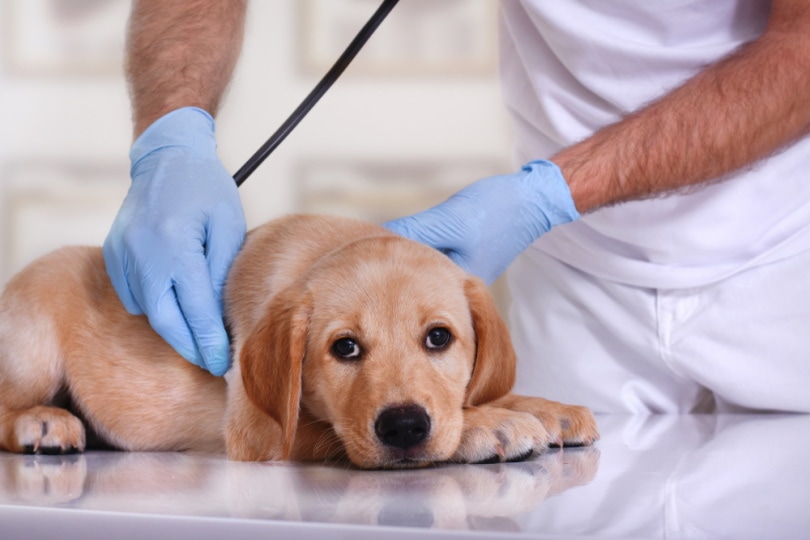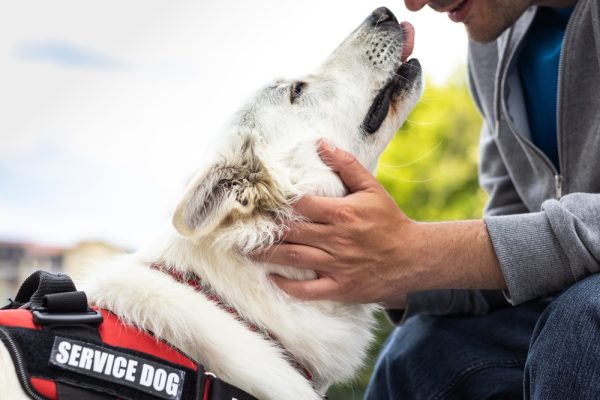In this article
View 4 More +Having a new dog or puppy can be overwhelming, and so can the costs. Being prepared for expenses can help ease your anxiety and avoid unexpected bills. For example, vaccinations are among the most important healthcare costs.
Let us look at what you can expect to pay for dog and puppy vaccinations in Canada.

The Importance of Dog and Puppy Vaccinations
Veterinarians agree that providing your dog with core vaccinations is essential to protect them from a preventable, sometimes fatal, disease. Immunizing your dog not only protects your dog but also prevents your dog from transmitting diseases to other dogs and even humans. The core canine vaccines are as follows:
- Rabies: Rabies is a well-documented disease that is always fatal for dogs. It is transmissible through the saliva of infected animals. Since most domestic animals are vaccinated, rabies is most often contracted from wild animals like mice, bats, raccoons, or coyotes. It can infect humans. In most places, rabies vaccination is mandatory for dogs.
- Canine distemper: Canine distemper can be transmitted between dogs through bodily fluids or by drinking out of the same water bowl as an infected animal. While it’s not guaranteed to be fatal, this disease causes irreversible nerve damage.
- Hepatitis or adenovirus: Hepatitis causes liver failure, vision impairment, breathing difficulties, and sometimes death. It is passed between dogs through bodily fluids.
- Parvovirus: Parvovirus is often fatal and brutally contagious. Puppies and senior dogs are the most likely to succumb to parvovirus, but it can still require extensive intervention to treat in adult dogs. This illness causes disturbances in your dog’s gastrointestinal system.
Several other vaccinations are considered non-core vaccines that you may choose to give your dog to prevent various diseases. These are typically bacterial diseases that are contracted in different environmental circumstances. They include things like Bordetella (kennel cough), parainfluenza, leptospirosis, and Lyme disease.
The best way to determine whether your dog needs non-core vaccines is to discuss them with your veterinarian.
If you need to speak with a vet but can't get to one, head over to PangoVet. It's our online service where you can talk to a vet online and get the advice you need for your dog — all at an affordable price!
How Much Do Dog & Puppy Vaccinations Cost in Canada?
In your puppy’s first year of life, you can expect to pay between $100 and $350 for routine care and vaccinations. After that, annual vaccinations typically cost between $80 and $250 per year.
Additional Costs to Anticipate
In addition to core vaccinations, you should expect to pay for routine deworming, flea-and-tick prevention, and heartworm testing and medication if you live somewhere with heartworm-infected mosquitoes.
In Canada, high-risk areas are limited to southern Ontario, southern Quebec, southern Manitoba, and the Okanagan area in British Columbia. Research suggests that heartworms cannot survive in the climate of Alberta and Saskatchewan.
- Heartworm tests: $35 annually
- Heartworm prevention: $24–$132 annually
- Flea and tick prevention: $40–$200 annually
- Deworming: $80–$200 annually

How Often Should I Vaccinate My Dog or Puppy?
Here is the typical puppy vaccination schedule:
| 6–8 weeks | 10–12 weeks | 16–18 weeks | 12–16 months | Over 16 months | |
| Core vaccines | Distemper and parvovirus | DHPP | DHPP and rabies | DHPP and rabies | DHPP every 1 to 2 years,
rabies every 1–3 years |
| Non-core vaccines | Bordetella | Influenza, leptospirosis, Bordetella, Lyme disease | Influenza, leptospirosis, Bordetella, Lyme disease | Influenza, leptospirosis, Bordetella, Lyme disease, coronavirus | Annual boosters |
Does Pet Insurance Cover Dog and Puppy Vaccinations?
Pet insurance policies are designed primarily to cover unexpected expenses resulting from an accident or illness. Most basic policies do not cover the costs of routine vaccinations. However, a few companies offer add-on coverage for routine care at an extra cost. Some of these packages cover vaccinations.
 Conclusion
Conclusion
Vaccinations are considered part of a dog or puppy’s standard routine care. The cost of vaccines should be considered part of your budget to keep your pet healthy. The best resource is your veterinarian if you have questions or concerns about specific vaccinations or side effects. They can answer your questions and recommend which vaccinations are necessary for your dog.
Related Reads:
- How Much Does It Cost to Install an Invisible Dog Fence?
- When Does a Kitten Start Eating Food & Drinking Water? Vet-Approved Facts & FAQ
Featured Image Credit: IgorAleks, Shutterstock




















